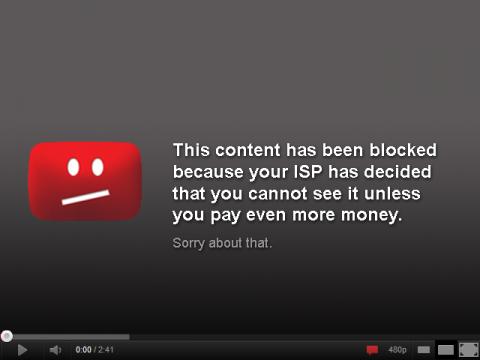Share
BE SMART ABOUT: FCC Net Neutrality Vote TODAY

The FCC will take the next step towards ending net neutrality on Thursday, May 18th.
On Thursday, the FCC will vote on whether to solicit public input on the proposal to undo the rules, the first step in the process of rolling them back.
The reason this action is occuring is because FCC Chairman Ajit Pai (read our piece here) is attempting to meet the needs of the corporations who own him rather than represent the citizens who he is supposed to work for. He's wasted no time becoming an enemy of the people he's supposedly representing. A few prior examples of his destructive work are here and here.
Major companies that oppose the rules — like AT&T, Comcast and Verizon — have maintained that they support net neutrality principles and promised not to abuse their powers in the absence of the FCC’s rules. But net neutrality supporters argue that this is not enough. “Without net neutrality as a matter of rule and law, there is nothing that prevents them from treating content or websites differently,” Sen. Brian Schatz (D-Hawaii) said in his own floor speech. “And in fact, they will have financial incentives to do just that because making profits is their obligation.”
Why is there an attack on net neutrality? There's no problem that needs to be fixed. It's actually a policy that's done tremendous good and had previously received bipartisan support.
Net neutrality refers to rules intended to ensure that broadband providers cannot block content or provide faster delivery to companies that pay more. The policy was put in place in the George W. Bush administration, where it enjoyed bipartisan support. In the years since, it has sheltered bloggers, nonprofit organizations like Wikipedia, smaller tech companies, TV and music streamers, and entrepreneurs from being throttled by providers like AT&T and Verizon that own the “pipes.” Television has been revitalized, and waves of successful internet start-ups have returned America’s high-tech industry to unquestioned global leadership. Net neutrality has been among the most effective economic policies of the 21st century.
The idea of killing net neutrality certainly has nothing to do with voters or majority will. Instead, the proposal, like Mr. Pai’s earlier gutting of privacy protections for cable customers, is at war with the economic populism that voters claimed they wanted and that Mr. Trump promised last year. Make no mistake: While killing net neutrality may be rolled out with specious promises of “free video,” there is nothing here for ordinary people. Lowering prices is just not something that cable or phone companies will do except under pressure. Instead, the repeal of net neutrality will simply create ways for cable and phone companies to tax the web and increase your broadband bill. Raise your hand if that sounds enticing.
Susan Crawford in the New York Times last month made the issue of net neutrality very simple in these few sentences:
If there’s one thing that brings Americans together, it’s our hatred of the giant companies that sell us high-speed data services. Consumers routinely give Comcast, Charter (now Spectrum), Verizon, CenturyLink and AT&T basement-level scores for customer satisfaction. This collective resentment is fueled by the sense that we don’t have a choice when we sign up for their services.
By and large, we don’t: These five companies account for over 80 percent of wired subscriptions and have almost total power in their territories. According to the Federal Communications Commission, nearly 75 percent of Americans have at most one choice for high-speed data.
It’s about to get worse: President Trump’s F.C.C., under the leadership of its fiercely deregulatory chairman, Ajit Pai, wants to let these companies become even more powerful by letting them do whatever they want and allowing them to merge with one another. The Big Five would love to get rid of this oversight, in part because they have become big players in providing content themselves, and Mr. Pai has put dismantling this structure at the top of his agenda.
Or she can make it even simplier:
Would you want five companies owning every road in America and deciding who gets to travel where, at what price and speed? Taken further, should Verizon be able to require that the “internet of things” include only its things?
Be Smart about Ajit Pai. Actively Dissent.
ACTION: The plan will face review by Congress. Look up your Senator and Representative using the tool in the upper-right of the web site. Call them and let them know how you feel about net neutrality. There will be many actions and votes attempting to roll back important rules to protect Americans in many facets of our everyday lives. We need to stay vigilant to not get bogged down in scandals and corruption charges while these supposed leaders seek to dismantle the government.
Sources:
https://www.nytimes.com/2017/04/17/opinion/donald-trumps-multi-pronged-attack-on-the-internet.html
https://www.nytimes.com/2017/04/28/opinion/the-fix-for-net-neutrality-that-consumers-dont-need.html
